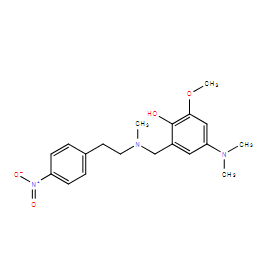| References: |
A cell-permeable ortho-hydroxybenzylamino compound that displays antitumor properties. Acts as a potent, selective and irreversible inhibitor of CDC25 phosphatase family (IC50 = 2.4, 3.9, 6.3, 5.4, and 4.6 µM for 25A, 25B2, 25B3, 25C, and 25C-cat, respectively). Displays ~20-fold greater selectivity for CDC25 phosphatases over CD45 tyrosine phosphatase. Shown to delay cell cycle progression in vitro (IC50 = ~7.2-32.6 µM), and reduces tumor growth in athymic mice xenografted with the human pancreatic cells MIA PaCa-2 (15 mg/kg, i.p. route)..CDC25 dual-specificity phosphatases are essential regulators that dephosphorylate and activate cyclin-dependent kinase/cyclin complexes at key transitions of the cell cycle. CDC25 activity is currently considered to be an interesting target for the development of new antiproliferative agents. Here we report the identification of a new CDC25 inhibitor and the characterization of its effects at the molecular and cellular levels, and in animal models. BN82002 inhibits the phosphatase activity of recombinant human CDC25A, B, and C in vitro. It impairs the proliferation of tumoral cell lines and increases cyclin-dependent kinase 1 inhibitory tyrosine phosphorylation. In synchronized HeLa cells, BN82002 delays cell cycle progression at G1-S, in S phase and at the G2-M transition. In contrast, BN82002 arrests U2OS cell cycle mostly in the G1 phase. BN82002 reduces growth rate of human tumor xenografts in athymic nude mice. BN82002 is a original CDC25 inhibitor that is active both in cell and animal models. This greatly reinforces the interest in CDC25 as an anticancer target. |























